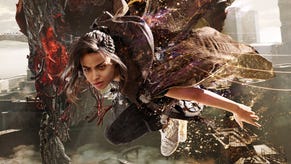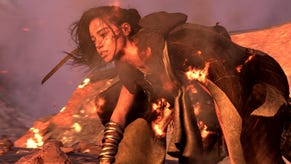Forspoken is magical but it's an awkward collision of east and west
Freyed edges.
Magic is at the core of Forspoken. Athia is an other-world full of wonder and mysticism and evil sorceresses, while protagonist Frey is given spectacular superhuman elemental powers. There's a surprising dollop of comedy too among the occult grandeur.
Yet after playing the game on PlayStation 5 at a recent preview event, I still have concerns about both its representation and its combat, despite its magical potential.
I suspect that Forspoken will be at its best when it's most freeing. The freedom to explore the wide open plains and crumbling ruins of Athia and complete its myriad side activities. The freedom to fully customise Frey's abilities. The freedom to flip between its extensive collection of spells to deal elemental damage and exploit weaknesses.
(Having played the newly released demo at the weekend, I can confirm this is the case. The demo is a snapshot of the open world that provides more of a playground for Frey's abilities than the more linear preview build I played.)
There's certainly the promise of depth to the game's combat, but the early chapters I played through were a little too scripted. Tutorials and cutscenes occur every few steps as gameplay and plot layers unravel; a laughable stealth section practically played itself; and I didn't have enough time to truly get to grips with the range of magic that will be available.
Luminous Productions has promised that Frey will eventually have access to one hundred spells. These are split between offensive (right trigger) and support (left trigger). Whether the sheer amount of options offers welcome complexity or just overwhelms remains to be seen, but there's an arcane joy in whipping up spells and dishing out damage in a barrage of particles.
Flow, however, is the game's key mechanic. This is Frey's magical parkour that allows her to dash off at great speed, leap vast gaps, and flip around enemies. It's all handled with one button that sees Frey performing all manner of acrobatics.
"When we thought about approaching a new IP, we thought what would happen if we really focused in on this magic element and really brought that out to its full capacity," co-director Takefumi Terada told me.
"We started with normal parkour and thought what would happen if we added magic into that? Whether that would be super fast speed or whether it would be being able to jump great heights or, if we took something normal and then added magic into it, what would happen?
"And in the same way, we've also created spells where, say we had a sword or a spear or some sort of regular weapon, what if we made that magical? What if we really poured magic into that? I think we've managed to create things that are unlike anything players will have seen before, a completely new approach to the elements."
.png?width=690&quality=75&format=jpg&auto=webp)
Between magical burst shots and high speed parkour, the result feels like a merge of Control and Sonic. Aiming and shooting Frey's early spells is akin to magical pistols, machine guns, and shotguns. And just as Sega has struggled with the blue blur in 3D, Frey's speed cannot be contained.
While she mostly speeds off as intended, she occasionally stumbles up buildings or leaps off cliffs into the empty abyss below. Locked on to enemies and using parkour to dodge their attacks, the camera sometimes swings dizzyingly. Put all that in a small enclosed area and throw in a fireworks display of effects and it all becomes a little too disorientating, despite the developers aiming for clarity.
Frey is freed in wide open spaces where she bounds and gallops. Athia is an enticing world to explore, without an overabundance of map markers. Combat challenges provide an opportunity to permanently increase stats. Pools of mana act like platformer collectibles to steer you across the land. Locked labyrinths transport Frey underground to crypts crawling with enemies and bosses. Monuments unlock enhancements, while Founts of Blessing unlock new spells.
It's typical open world stuff, sure, but it lends Frey's story an adventurous sense of exploration. Athia is beautiful too, from its central medieval city to its decaying wasteland spoiled by a spreading corruption called the Break, despite some stiff NPC animation. A later area had scorched earth, glowing ruby crystals, and an ominous scarlet sky.
Safe houses act as waypoints to rest up and customise Frey's loadout. Potions can be crafted and extra buffs can be applied to her outfits. Again, typical open world stuff. Best of all is the ability to paint her nails with protective enchantments. This old practice, incidentally, was originally done in the sacred blood of the Tantas, really adding to the occult tone.
Who are the Tantas? They are the corrupt matriarchs who act as Frey's main antagonists. I won't spoil any story details here but... they're quite unkind.
It's refreshing at least, though, to have a cast of characters who are predominantly women.
.png?width=690&quality=75&format=jpg&auto=webp)
"The only thing that we started with is let's make a game about magic in a fantasy world," said creative producer Raio Mitsuno.
"And one of the ideas that came up was what if we had these sorceresses that ruled the world? What if we changed things up a little bit? I know there are matriarchal societies in the world. But in games, we don't see that too often. So let's make a matriarchal society world that's ruled by these powerful sorceresses.
"Then naturally, we wanted to create a character that is from our world, as a force that's going to deal with these sorceresses. We wanted a female character to really lead the story. It just became one of those things where the story that we wanted to tell ended up being a game where a lot of the key characters are women."
Recently, a certain video tweeted out drew criticism at the game's poorly written and overly frequent dialogue. There have also been concerns about side character Cuff and the amount of chatter between him and Frey. In this preview, though, it wasn't a problem. What's more, there's an option to amend the frequency in the accessibility options, which also contains plenty of visual and control flexibility.
"Frey at least is a character that is not from that world. So she is going to react to things more than people who actually live in Athia. So that was a key defining feature for Frey to begin with. And in terms of the amount of talk, or bantering back and forth, between Frey and Cuff, some of it was fine tuned as we went through development," said Mitsuno.
"Not just the amount or frequency of the dialogue, but a lot of the features were added as part of a bigger concept of accessibility and making every experience unique to the player and more friendly for them. It was part of an overarching idea of let's make the game more accessible and fit for every type of player."
Cuff actually adds some welcome comedy. Athia and its populace are all a bit gloomy with the encroaching Break, but Cuff and his banter with Frey brings some levity.
"[Comedy is] one of the things that I'm so excited for players to see when they actually get to play the game. It's not stuff that really comes across in material that we're showing for promotional uses," said Mitsuno.
"The situation is very grim. A lot of it's dark, the Break is taking over most of the land, there's only one city left standing that people are living in. So it's very bleak in that sense. But then you have a character that's from our world who sees things the way that we see things and when she's there, she brings a little bit of her personality with her. And then there's also Cuff who has that dry natural sarcasm as well.
"We want to make sure there are moments where it's light hearted, and it's fun to just be around the characters. But there is a bigger thing going on in the world. So it's a fine balance."
.png?width=690&quality=75&format=jpg&auto=webp)
.png?width=690&quality=75&format=jpg&auto=webp)
Really the concern shouldn't be for Cuff, but for Frey herself. The development team previously raised eyebrows when Frey was described as having a "hip-hoppy kind of walk". And it must be noted that the writing team is entirely white, which brings the authenticity of Black lead Frey into question.
"Frey was the first character that we designed and we started from the inside out," said Mitsuno. "We said this is the type of character we want, this is Frey's personality, these are her character traits, this is her core, this is how she talks.
"As we established those elements and the things that make up Frey, we went to the casting process and Ella Balinska just ticked all those boxes: she has the sense of humour, she has the determination, she also has that soft, vulnerable side that we weren't afraid to have. So all the complex details that we wanted Frey to convey, Ella just was able to knock all of those things out.
"And she herself really was drawn to the character and she connected to the themes and what Frey stood for. And that's when we decided to model the character after her as well to really create that authentic character that she's going to portray. She gave a lot of input into 'this is how I would speak if I was Frey, this is how I would think if I were Frey'.
"In that sense, we've created the character that is active and portrayed by Balinska and is also modelled after her. In that sense, we've created this realistic character that everyone can relate to."
In practice, though, there are some awkward decisions. The first time Frey meets another human in Athia, she's handcuffed and accused of being a monster by a crowd of predominantly white NPCs, which felt particularly jarring. Her criminal record is also included as a readable document in the game's journal.
Her dialogue, too, lacks authenticity. She refers to her trainers as her kicks; she constantly swears; and she's quick to anger. This all plays into the anachronistic outsider quality of the character and Balinska's performance is likeable, but stereotypes in the script bely an overeagerness to be cool and edgy. The poncy British accent of Cuff is a clear foil.
.png?width=690&quality=75&format=jpg&auto=webp)
Really, the lack of authenticity feels symptomatic of the game's development. Luminous Productions, many of whom previously worked on Final Fantasy 15, is based in Japan, but the decision was made to develop Forspoken with an English first approach. This proved to be one of the biggest challenges.
Said Mitsuno: "Because we've worked with story writers in the West... naturally we decided for this game English was going to be the first language that we create. A lot of games that we've done in the past, it starts in Japanese and then it gets localised into other languages. This time around, we said English is the primary language, which then gets localised into the other languages. So everything was kind of backwards in that sense.
"We did casting for English actors first, we did [performance capture] overseas. Unfortunately with the pandemic, we couldn't go over, so we had to watch p-cap sessions over Zoom. So it was a little bit unfortunate.
"That was, I think, a challenge overall from a studio perspective of trying to create a game in English as the main language. But I think that was something that was necessary to give the authenticity of the story that was told through the minds of Gary, Amy, Todd and Allison."
As a result, Forspoken feels like a collision of east and west. And it takes a certain kind of magic to make that work.
Forspoken will release on PlayStation 5 and PC on 24th January 2023.
.png?width=690&quality=75&format=jpg&auto=webp)






.png?width=291&height=164&fit=crop&quality=80&format=jpg&auto=webp)
